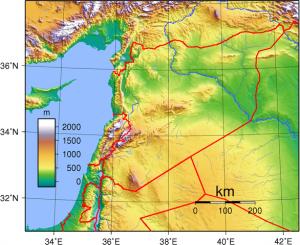Some questions before we bomb Syria
**Posted by Phineas

Threat Matrix, the blog of The Long War Journal, has some questions that need answering before President Obama, having decided Syria has crossed his ill-advised “red line,” gives the “go” order. Here are a few of most interest to me:
3. Is there a possibility that the Aug. 21 attack was an accidental hit — of chemical stocks belonging to either the regime or the rebels — by the undisputed massive regime bombardment in the area at the time? It is known that the regime has been frequently moving its chemical weapons to keep them out of rebel hands, and it is also known that rebel fighters, including al Qaeda-linked groups, have sought and reportedly had access to chemical weapons also. The Al Nusrah Front is known to have pursued chemical weapons; credible reports of the group plotting to conduct sarin and mustard gas attacks have emerged from Iraq and Turkey over the past several months.
(…)
6. The regime has much to lose by mounting chemical weapon attacks, and especially while UN inspectors are in country and the world’s eyes are turned toward Syria. Why now? Is the basic vagueness of the US’s accusation due to a Western decision that now is the time to intervene militarily, regardless of who perpetrated the attack, since there is clearly a very distinct danger of the spread of chemical warfare in the region at this point?
…and…
8. What happens if the US actually succeeds in killing Assad and overthrowing the government? Will Islamist terror groups such as the Al Nusrah Front and the Islamic State of Iraq dominate the political scene in Syria, as they have dominated the fighting? Is that in the best interests of the US and the West, or, for that matter, those of Syria and the region? The West’s efforts for a resolution to the conflict in Syria ultimately hang upon the fragile hope that moderate forces will prevail, in a situation where the two strongest forces, the Assad regime and its largely Islamist opponents, each offer only harsh alternatives.
These are darned good questions, especially that last one. In one sense, it’s easier to deal with brutal, but secular, dictators; one can find mutual interest and cut a deal, even if that interest is simply survival. But apocalyptic minded fanatics who think conquering or destroying you is a divinely ordained mission? They simply don’t operate in the same paradigm we do, and coming to a genuine modus vivendi (other than “we surrender”) is usually impossible.
In the Telegraph, Tim Stanley asks a question related to number six, above: Why would Assad do something that would guarantee Western intervention in a war he’s winning?
Second, why would the Assad regime do something so stupid? It must know that by using chemical weapons it would isolate itself from any international support and invite a Western military response. More importantly, Assad was already winning the war – so why bother to use WMDs during the last lap to victory? Indeed, the only people who have anything to gain by Assad using chemicals are the rebels, because that would internationalise the conflict in a way that they have long lobbied for.
And yet there is a good case for intervention. Daniel Hannan weighs the arguments pro and con from a British national-interests point of view and, while he finds the interventionist arguments inconclusive, he concedes their strengths. Meanwhile asking a question for the pro-interventionists, Jim Geraghty (sorry, newsletter only) asks: If Assad has used chemical WMDs, are we prepared to accept the consequences of doing nothing:
The world has actually made good progress at eliminating existing stockpiles of chemical weapons. Most regimes have concluded the diplomatic and public relations cost isn’t worth keeping their aging stockpiles around. But . . . if an embattled regime like Assad’s successfully uses them to put down an insurrection with no major consequence short of rote international denunciation . . . how quickly will the cost-benefit calculus change? How certain could we be that Pyongyang, or some other embattled regime, wouldn’t feel the temptation? These sorts of weapons are cheap and relatively easy to make using regular civilian chemical equipment.
That’s not an easily dismissed possibility. It’s not for nothing that chemical weapons have been called the “poor man’s nukes.”
I myself have no good answers, though I’ve favored some sort of limited intervention since the civil war started, since hurting Assad hurts his patrons in Iran, the real source of much of the trouble in the Middle East and which, as Michael Ledeen persuasively argues, should be the focus of our efforts.
As for the administration having the answers…. Heck, I doubt they’ve even asked the right questions.
(Crossposted at Public Secrets)
